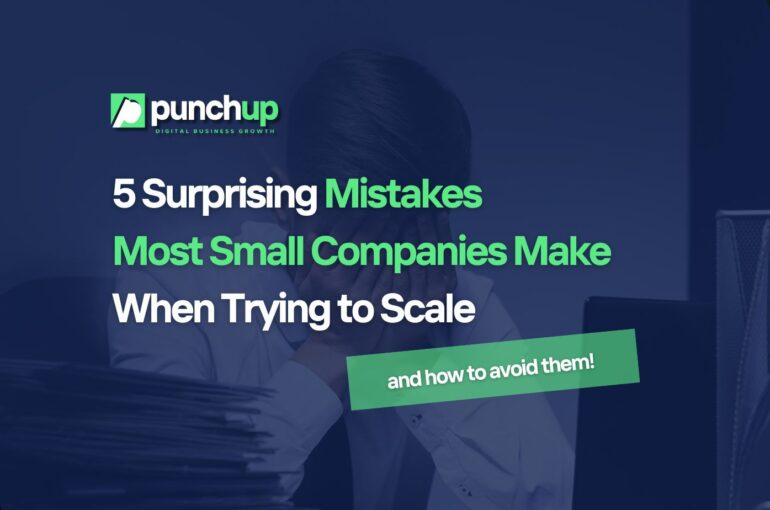5 Surprisingly Naive Mistakes Most Small Companies Make When Trying to Scale (and how to avoid them)
5 Surprisingly Naive Mistakes Most Small Companies Make When Trying to Scale (and how to avoid them)

Scaling a small company is like conducting a high-stakes symphony. It requires a harmonious blend of strategy, talent, and resources. While the traditional approach to growth often involves hiring more people, there’s a more efficient way – optimising your internal resources and processes. However, many small companies unknowingly fall into some surprising pitfalls on their scaling journey. Let’s explore these five surprising mistakes and how to avoid them.
Bonus: Check at the bottom what to do to avoid them!
-
Neglecting Training and Upskilling:
It’s a common misconception that to grow, you need more hands on deck. Instead of hiring, consider upskilling your existing team. Neglecting training can lead to unproductive employees and a revolving door of new hires. Investing in the development of your team can result in a more skilled and motivated workforce, ultimately saving you time and resources in the long run.
-
Overlooking Process Optimisation:
Small businesses often grow organically, with processes emerging on the fly. Scaling without a solid foundation can lead to chaos. Overlooked process optimisation can result in inefficiencies, bottlenecks, and wasted resources. To scale successfully, take the time to streamline and document your processes, making sure they can handle increased demands.

-
Ignoring Data-Driven Decision Making:
In the digital age, data is your best friend. Ignoring the power of data-driven decision-making is a grave mistake. To scale effectively, you need to gather, analyze, and act on data to understand customer behaviors, market trends, and the performance of your operations. Use this information to make informed strategic choices.
-
Underestimating the Importance of Technology:
Technology can be a small company’s greatest ally when scaling, but many underestimate its potential. Investing in the right tools, software, and automation, specially now with the rise of AI solutions, can significantly improve efficiency and productivity. Don’t shy away from technology – embrace it as a way to optimise your operations and support growth.
-
Failing to Build a Strong Company Culture:
As companies expand, maintaining a cohesive company culture can become a challenge. Small businesses often overlook this crucial element. A strong company culture can foster employee loyalty, inspire collaboration, and attract top talent. Make sure your company values and culture align with your scaling efforts to create a united, motivated workforce.s
"Success in scaling doesn't always mean adding more. It often means optimising what you already have.
Like a sculptor carving a masterpiece from a single block of marble, the right guidance can help you shape your business into a work of art without overburdening your resources."
Conclusion (before we give you some suggestions to avoid this mistakes):
Scaling a small company is a delicate balance between resource optimisation and growth strategy.
By avoiding these surprising mistakes, you can achieve sustainable and efficient expansion.
Remember, it’s not always about hiring more people; it’s about optimising your internal resources and processes, upskilling your team, and making data-informed decisions. As you navigate the scaling journey, keep these lessons in mind to ensure a harmonious and successful symphony of growth.
Scroll down for 5 things to help you grow your small company while avoiding these mistakes.
5 Things You Can Do Today to Avoid These Mistakes and Start Scaling Smartly
-
Identify Skill Gaps and Create a Training Plan:
Take a closer look at your team’s skills and identify any gaps that may hinder your growth. Develop a training plan to upskill your employees. There are plenty of online courses and resources available to help your team acquire the knowledge and expertise needed for your industry.
However, we’d suggest, considering specialised business growth coaching and consulting services, which can help you identify and address skill gaps while offering tailored training solutions, specific to you, your team and your market, which you can really start actioning immediately, making them much more valuable than generic online courses.
-
Conduct a Process Audit:
Gather your team and conduct a process audit. Identify bottlenecks, inefficiencies, and areas that need improvement. Document your processes and create clear workflows.
This exercise will provide you with valuable insights and a roadmap for process optimisation. For a more streamlined approach, consider consulting with business process experts who can help you with process audits and optimisation strategies.
-
Implement Data Analytics Tools:
Explore data analytics tools that align with your business needs. Google Analytics, customer relationship management (CRM) systems, and market research tools can provide valuable data.
Set up these tools and begin collecting data to inform your decisions. If you’re looking for expert guidance in data-driven decision-making, consider a business growth consultant who can help you set up and interpret data analytics tools effectively.
-
Embrace Technology Solutions (Yes, AI too!):
Identify areas in your business that can benefit from technology solutions. Whether it’s automating repetitive tasks, improving communication with team members and clients, or enhancing customer service through chatbots, start implementing technology solutions to optimise your operations.
We’d suggest taking a specialised course on AI for Marketing in order to learn how to optimise and improve several of your everyday processes, being able do to more, better.
Also, a business growth consultant can provide insights into the right technology solutions for your specific needs.
-
Foster a Strong Company Culture:
Don’t wait to foster a strong company culture. Start today by clearly defining your company’s values and vision. Communicate these values to your team and lead by example.
Encourage open communication, teamwork, and a positive work environment. Your company culture should reflect your scaling aspirations.
For expert guidance in building a strong company culture that supports growth, consider a business growth coach who specialises in cultural development.
By taking these steps and considering the support of expert business growth coaching and consulting services, you can begin avoiding the common scaling mistakes and set your small business on a path to smart and sustainable growth.
Remember, the journey to successful scaling begins with proactive and intentional steps, and often, these steps can be more cost-effective and efficient when guided by experienced consultants.



